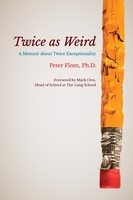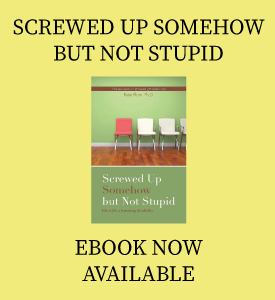All human beings have limits. Learning disabled people may have more severe limits than others. And I am pretty sure that we get told, more often than others, to push our limits. In addition, parents of LD kids get told to push their kids’ limits.
Sometimes this is good advice. Sometimes it isn’t.
There is a Yiddish saying “Never try teaching a pig to sing. It wastes your time and annoys the pig”. But when are we teaching pigs to sing? It’s hard to know. Indeed, it is impossible to be sure. But we can make two mistakes: We can try to teach a pig to sing – and annoy the pig; or we can not try to teach a pig to sing, and maybe the pig is not a pig, and can actually sing. We can push our limits, or accept them. Either choice can be wrong or right.
But we can’t push all our limits, all the time. There are only so many hours in a day, so even if we pushed all the time, that would be only 15 or so hours a day. But even that isn’t advisable, I don’t think. It may not even be possible. Sometimes, pushing a limit leads to too much frustration for the amount gained – whether it is a gain in competence, or acceptance, or money. What of ourselves and our children do we simply accept, and say “That is how I am”?
It is true that virtually anyone can get better at virtually anything, with enough practice. But some of us get better at some things so slowly! Is it worth it? How good do we have to be? Do we need to get better?
Can we enjoy doing something badly?
One saying that I like to turn on its head is “anything worth doing is worth doing well”. Instead, I say, “anything worth doing is worth doing badly“. Of course, that’s an exaggeration to make a point. Some things are not worth doing badly: Flying a plane. Performing surgery. “Ooops! Sorry I killed the guy, but I’m getting better!”. Of course, anyone who wants to be a surgeon has to practice, and no one starts out as a brilliant surgeon. But some people do have more aptitude for it. They learn faster. I would learn very slowly, and that would be so, no matter how much I practiced. If someone who had very little aptitude as a surgeon wanted to be a surgeon, should we let him or her? For how long? At what cost?
But for many activities, our cult of mastery does us no good. Must we play chess well to enjoy it? Or sing well? Or do any hobby? We have this idea that it is worth more to be better. Sometimes it is. But sometimes not.
When should we push, when should we accept?
I don’t know. But I know that we should do some of each.



Great article, Peter. These are all great points.
With a change of only a few words, your observations apply equally well to NTs. Just like us, they too have a variety of strengths and weaknesses and must consider these issues too whenever they consider pushing a limit.
Once again, it looks like we are in the same ballpark on this one. 😉
Peter — I read your on-line posts from time to time, and I’m always grateful for your insights. Our son is 12, and often I ask myself “Are we pushing too hard? Not enough? Is he enrolled in the wrong school? Is it too much for him? Will tomorrow be a better day?” It is so hard to find the right balance, and I’m always second guessing. But at the end of the day, he trusts me. He knows that I am doing my best to find a way to keep him engaged in the world, exploring his own limits, and pulling back when he feels overwhelmed. It isn’t smooth going, but he continues to try things in life. He has tried cello, swimming, taekwando, softball, scouting… the list goes on. Once in a while he finds something that he struggles with, but sticks with. He has been playing piano for six years, and some may say he “plays badly,” but I see his delight when he plays, and I am so grateful. Ultimately it comes down to that experience of delight in the doing of the thing, whatever it is. I use that as our guide.
Thanks again for posting.